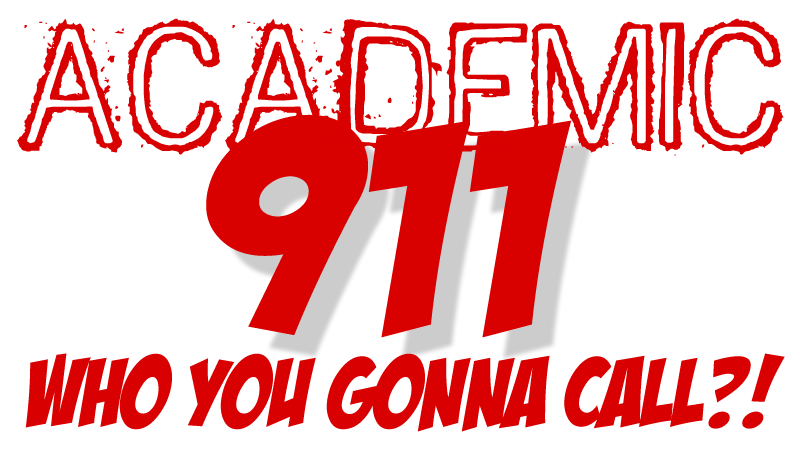
There is no one who gets through school without help. No one. Whether it’s a study group (recommended always), or videos on YouTube or a tutor for a subject, or standardized tests like the SAT or ACT, there is always a need to fill in the gaps that happen in your education. The single biggest problem most students have:
Knowing when things aren’t going well in advance of trouble.
Particularly if you’re taking our more advanced classes, AP Biology, AP Chemistry, Calculus A/B or B/C, Statistics, there are going to be days where the material you’re learning doesn’t make sense.
Too many of you wait until you get a bad grade for the wake up call. Some people are surprised by a poor performance on a test. Others kinda, sorta knew they weren’t getting it, but pride is a mighty thing. It can make you feel like you have everything handled, until you don’t.
If you did poorly on homework or a quiz, these are the warning signs that you need to get your head around the material on them.
So if you can, start using some of these resources BEFORE you get to the point that you can’t figure something out and you nosedive a quiz or test, you’ll avoid bad grades that need to be made up.
Suggestions:
- Attend Extra Help Sessions – A few of your teachers will offer help sessions at lunch. GO regularly. Even if you think you know it. Often times they will have information for you in these sessions which you did not get in class.
- See Your Teacher After Class – Email your teacher to arrange a time to talk about your homework or quiz or test that you did not feel comfortable with. Good teachers will make the time to answer your questions and help you. If they don’t then you have other avenues.
- Honors Society Student Peer Tutors – You can work with an Honors Society student peer tutor. Some are great teachers. Others? If you’re not feeling like they’re getting through to you, then move on to other suggestions below.
- Study Groups with a twist – Many of you already are part of a study group for a class or two. You should cover all of them. Have a group of people in your class, or taking the same class, with whom you can study BUT there is a wrinkle. Usually groups prepare BEFORE a test. Seldom do they meet AFTER a test. If you did well, help the others who didn’t do as well with the concepts that you understood. Get help from your group with the questions that you had a problem with. Quizzes and tests have information that is revisited on you at final exam time. I hear a lot of students say that “no one got” this bit of homework or that quiz. If so, then, after you get it back, you all should be going over it to figure out what you don’t know. If none of you still “get it,” then you should be using the other resources and sharing what you learn with your group to help all of you succeed. Take pride in the group’s success. Being able to be a part of a winning team is a skillset that you will need most of your life unless you are in a very solitary occupation.
- Free online resources like Khan Academy, and the many videos on YouTube, CGPGrey, ThatTutorGuy and others. We’ll list them separately.
- Pay per use resources – There are a lot of subjects though that you won’t be able to get free help from, because the answers that you need are specific to questions that you’re working with at 10pm at night, due the next day, and you have to get them answered. There are now a number of good services that offer help as you need it 24/7 from vetted, qualified tutors at a college level that can assist you. Tutor.com and Princeton Reviews academic tutorial service are excellent and fairly priced. If both are out of your budget range, Study Room offers more budget-priced services that can be helpful, including some good peer-to-peer networking, but, according to students using both, are more erratic in terms of the quality of the tutors helping out. There are others as well. We’ll list them in a separate article.
The big guns: If you find, even after all of that, that you don’t “get it” overall, that you are struggling and frustrated, then it is time to call in a local tutor.
There are a ton of them out there. It’s one of the biggest cottage shop industries in America, and everyone who knows a little something can hang out their shingle as a tutor. Finding the right one for you, and one that is good, can happen on the first try. It can also take a try or two.
Most people do it by personal referral. A friend or a friend’s kid who did well with tutor X. Sometimes that works well. Other times your learning style and the friend’s are not the same, nor is your interaction with the person helping. It’s a trial-and-error thing, much like finding the right music teachers. It may take a try or two to get comfortable with the right person.
Aside from personal referrals there are a lot of services. Many people in the area recommend Academic Advantage, Wyzant, Score At The Top, and others for in-home tutors. There are also courses and group classes offered by places like Kumon Learning Centers and Mathnasium that can help.
Some ground rules to help you get the most out of the money spent on tutoring:
- It is best to avoid places that make you sign any long-term contract or commitment;
- Come into tutoring with specific goals that you can achieve, like learning a particular skillset in math, or developing a better understanding of grammar. A good service or tutor should be able to work with you as you need them to, not have you fill in their weekly schedule.
- Watch for bait and switch: Some of these services require vetting of their tutors. A tutor will get rave reviews and have hundreds of positive ratings. When you call them, they suddenly want you to work with a friend of theirs who is not vetted. Don’t go there. Stick to people whose track record you can document and follow.
- Some big companies that tutor are all about selling their system, and/or a bunch of costly method books in addition to their tutoring fees. They will claim that the method trumps the tutors in their system. Don’t believe it. The best results come from tutors who tackle the material that you are working with in school, and can help you real-world problem solve not only how to deal with the coursework that you can’t understand well, but also with how to deal with the breakdowns in communication in the classroom, to make you a more effective student.
There is an old saying: You have to work as hard at getting an “F” as you do an “A.” Create the right support systems for yourself, and you will succeed your whole life.

Pingback: Recommended Professional Tutors | Dreyfoos School of the Arts (DSOA) College Music Advisory